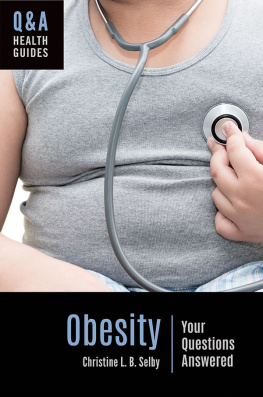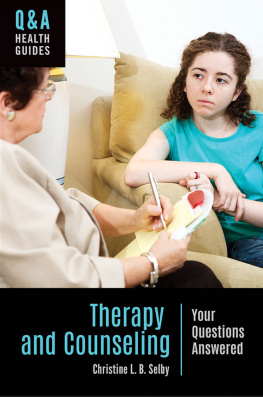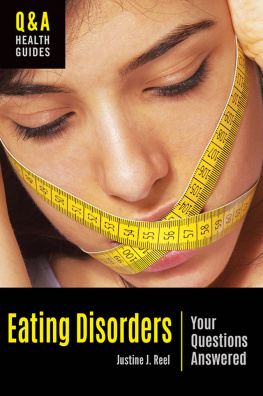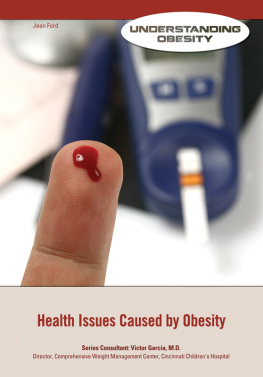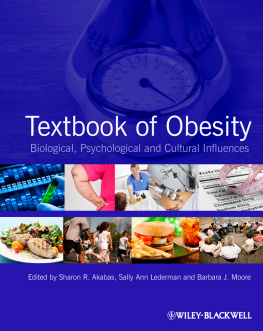Obesity
Recent Titles in
Q&A Health Guides
Self-Injury: Your Questions Answered
Romeo Vitelli
Living Green: Your Questions Answered
Amy Hackney Blackwell
Sexually Transmitted Diseases: Your Questions Answered
Paul Quinn
Mindfulness and Meditation: Your Questions Answered
Blaise Aguirre
Anxiety and Panic Disorders: Your Questions Answered
Daniel Zwillenberg
Substance Abuse: Your Questions Answered
Romeo Vitelli
Eating Disorders: Your Questions Answered
Justine J. Reel
Food Allergies and Sensitivities: Your Questions Answered
Alice C. Richer
O BESITY

Your Questions Answered
Christine L. B. Selby
Q&A Health Guides

Copyright 2019 by ABC-CLIO, LLC
All rights reserved. No part of this publication may be reproduced, stored in a retrieval system, or transmitted, in any form or by any means, electronic, mechanical, photocopying, recording, or otherwise, except for the inclusion of brief quotations in a review, without prior permission in writing from the publisher.
Library of Congress Cataloging-in-Publication Data
Names: Selby, Christine L. B., author.
Title: Obesity : your questions answered / Christine L.B. Selby.
Description: Santa Barbara, CA : Greenwood, An Imprint of ABC-CLIO, LLC, [2019] | Series: Q&A health guides | Includes bibliographical references and index.
Identifiers: LCCN 2018048403 (print) | LCCN 2018049221 (ebook) | ISBN 9781440861475 (ebook) | ISBN 9781440861468 (cloth)
Subjects: LCSH: ObesityMiscellanea. | Body weightRegulationMiscellanea. | ObesityTreatment. | Self-care, HealthPopular works.
Classification: LCC RC628 (ebook) | LCC RC628 .S444 2019 (print) | DDC 616.3/98dc23
LC record available at https://lccn.loc.gov/2018048403
ISBN: 978-1-4408-6146-8 (print)
978-1-4408-6147-5 (ebook)
23 22 21 20 19 1 2 3 4 5
This book is also available as an eBook.
Greenwood
An Imprint of ABC-CLIO, LLC
ABC-CLIO, LLC
147 Castilian Drive
Santa Barbara, California 93117
www.abc-clio.com
This book is printed on acid-free paper 
Manufactured in the United States of America
This book is dedicated to all who question whether or not you are working hard enough; you are.

Contents

Series Foreword
All of us have questions about our health. Is this normal? Should I be doing something differently? Whom should I talk to about my concerns? And our modern world is full of answers. Thanks to the Internet, theres a wealth of information at our fingertips, from forums where people can share their personal experiences to Wikipedia articles to the full text of medical studies. But finding the right information can be an intimidating and difficult tasksome sources are written at too high a level, others have been oversimplified, while still others are heavily biased or simply inaccurate.
Q&A Health Guides address the needs of readers who want accurate, concise answers to their health questions, authored by reputable and objective experts, and written in clear and easy-to-understand language. This series focuses on the topics that matter most to young adult readers, including various aspects of physical and emotional well-being as well as other components of a healthy lifestyle. These guides will also serve as a valuable tool for parents, school counselors, and others who may need to answer teens health questions.
All books in the series follow the same format to make finding information quick and easy. Each volume begins with an essay on health literacy and why it is so important when it comes to gathering and evaluating health information. Next, the top five myths and misconceptions that surround the topic are dispelled. The heart of each guide is a collection of questions and answers, organized thematically. A selection of five case studies provides real-world examples to illuminate key concepts. Rounding out each volume are a directory of resources, glossary, and index.
It is our hope that the books in this series will not only provide valuable information but will also help guide readers toward a lifetime of healthy decision making.

Acknowledgments
This work was a labor of love in many ways. I know there are others who would have written this book differently than I did. I feel, therefore, privileged to have been given this opportunity to write what I believe to be a series of balanced and accurate answers to questions that many people, including many of my patients, have about their weight and their struggle to understand why they weigh what they do. To that end I am grateful to Maxine Taylor for offering this project to me and for helping me to craft a comprehensive list of questions. She also provided tremendous support, encouragement, and invaluable editorial advice throughout the project.
I am forever indebted to my husband and my two sons. My husband supports me in every way imaginable and encourages me to pursue my passionsone of which is writing. My sons challenge me in ways I never could have imagined and have pushed me to be a better person and mom to them. I am truly fortunate.
Finally, I would like to acknowledge the men and women with whom I work who have struggled with their weight. They have done what so many have done before them and have been left feeling that what they weigh is their fault. Nothing could be further from the truth. Being witness to their tenacity and strength in fighting to find peace with their bodies and to treat their bodies with kindness is an honor.

Introduction
Obesity has been declared an epidemic for many years now, and our country has declared war on obesity. The problem with such a declaration is that it makes the individuals who have bodies classified as obese by a seriously flawed metric (i.e., body mass index) the target of this war. Declaring war on obesity has emboldened many to treat those who are obese with an attitude of prejudice and discrimination. This results in tremendous suffering, both physically and psychologically.
Scientific research is finally catching up with what many have stated for quite some time: what our bodies weigh is not simply a matter of figuring out how many calories we consume and how many we burn but is a result of a complex constellation of factors that include genetics, the degree of food security, the makeup of the bacteria in our gut, and, yes, lifestyle factors that include how much stress were under and how much sleep we get. Moreover, a growing body of literature has concluded that the diseases linked to obesity do not occur because of obesity but due to a number of symptoms that reflect what is called metabolic syndrome. These symptoms exist in human beings of all shapes and sizes, as do the diseases typically blamed on obesity.
Next page
